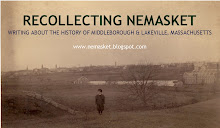.
“The ability to spell English words seems to be a gift of which many people are deprived,” remarked Superintendent Fitts in his report for 1889. Deploring the level of spelling skills found in children and adults alike, Fitts sought to improve the teaching of it in Middleborough schools. Throughout the period, local schools grappled with the best tools to employ in teaching spelling. In 1881, the Progressive Speller which was then in use at the Green was labeled by the local School Committee as “being one of the most obsolete text-books we know of.” It was consequently replaced by Worcester’s Speller, which in turn was gradually replaced in the late 1880s by Harrington’s Graded Speller for upper level students.
Oral spelling was emphasized in the first three years. “In the fourth year we begin to write formal lessons in a book which is preserved and used day after day.” Spelling as an educational subject gained increasing visibility during the last decade of the 19th century, so much so that by 1899 “its importance is more generally recognized than at any previous time.” Superintendent Jacoby at this time sought to bring Middleborough’s teaching of spelling in line with the theories of Dr. Edward R. Shaw, Dean of the School of Pedagogy at New York University, who considered learning to spell as a matter largely of association.
Subscribe to:
Post Comments (Atom)













+-+Copy.jpg)

+of+Smoky+Mountains+018.jpg)
No comments:
Post a Comment